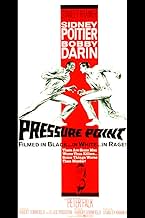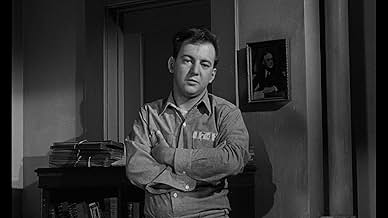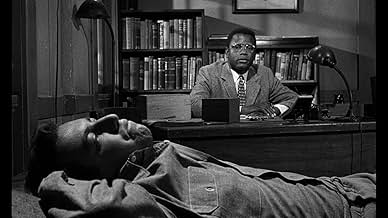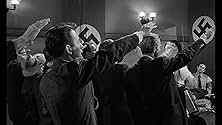Füge eine Handlung in deiner Sprache hinzuA Black prison psychiatrist is assigned the distasteful task of helping a paranoid American Nazi charged with sedition.A Black prison psychiatrist is assigned the distasteful task of helping a paranoid American Nazi charged with sedition.A Black prison psychiatrist is assigned the distasteful task of helping a paranoid American Nazi charged with sedition.
- Regie
- Drehbuch
- Hauptbesetzung
- Auszeichnungen
- 1 Nominierung insgesamt
- Father
- (Nicht genannt)
- Bund Meeting Spectator
- (Nicht genannt)
- Inmate
- (Nicht genannt)
- Bund Meeting Spectator
- (Nicht genannt)
- Patient
- (Nicht genannt)
Empfohlene Bewertungen
Poitier as always has a very authoritative presence and he and Darin work extremely well together. They have a lot of dialogue to deliver and completely immerse themselves in these troubled characters. Darin reveals enough depth here that people may wonder why he didn't pursue more serious roles. Cornfield creates some wonderfully stark atmosphere and stylish visuals, but never goes overboard, having the proper respect in the source material, a true case detailed in Dr. Robert M. Lindners' "The Fifty-Minute Hour". Some moments are quite memorable, such as the scenes with the patients' unloving father (James Anderson), a butcher. There's also an incredible scene of an epic session of tic-tac-toe that could have come off as silly but which has a powerful creepiness about it.
Overall, this is an effectively done little drama that isn't as well known as it ought to be. It's well worth seeing for the interplay between Poitier and Darin alone.
Eight out of 10.
I've heard "Mack the Knife" and other snappy songs by him, but I only recently realized that he was an actor as well. I'll admit that this was not a rented movie or something I sought out, just one that I caught from the classic channel, but it was from beginning to end, no commercials or cuts and I cannot express how much admiration I have for Bobby Darin. He came from a weird life (a life only Jack Nicholson could relate to) and add to that a disease that shortened it, but Bobby Darin made his time around one to be remembered. This man's performance in 'Pressure Point' stunned me.
Darin plays a man who's childhood was not one to be envious of. This man's life became even less envious, because the story takes place inside a prison where he is a convict. Sidney Poitier plays the prisons psychiatrist and Darin is sent to him because he cannot sleep due to anxiety. Poitier's character has a hard time with Darin's due to the fact that he is extremely racist (a Nazi even) and is continually treating Poitier as though he understands how he feels is wrong but doesn't care (that is the attitude that I got from it). That he knows everything he feels is based on a lie but he simply does not care...it allows him to be violent and hateful and that is why he does what he does. It's pretty scary and even though sometime you think, "goodness, I hate that sometimes what Darin's character is saying makes a little sense, what in the world is Poitier going to say to that?", that's when the doctor sets him straight.
I am a pretty emotional person and this movie really knows how to pull at them, even for an older movie, it has its 'I can't believe he said that' moments, but it was very impressive for Bobby and Sidney to do a movie with such a point, when others at the time were doing such cheesy things.
The film is most impressive for its refusal to pander to an audience whose enjoyment might be enhanced if all the conflicts between the protagonists were resolved at the conclusion, but "Pressure Point" does not compromise its own integrity by pretending to provide easy answers to the questions it raises. Doctor and patient do not reach an understanding-- they do not embrace each other at the end, nor does the film suggest that society has benefitted from the encounter between two such disparate souls. Life simply goes on, and so do its troubles. "Pressure Point" makes its point subtly without a lot of sanctimonious preaching, and is more effective as a result.
The two stars are well matched with Poitier bringing his usual humanity and quiet pride to a role that does not place as much emphasis on his skin color as one would expect in a 1962 production. Darin is simply superb as Poitier's patient, and one can't help but admire the popular crooner for having had the courage to inhabit such an unappealing character at a time when he was still one of pop music's most prominent "teen idols" (and husband of America's sweetheart, Sandra Dee). The cinematography, music, and direction (by Hubert Cornfield) match the performances perfectly.
Wusstest du schon
- WissenswertesProducer Stanley Kramer directed the framing story, which refers to the present-day story that Sidney Poitier tells to Peter Falk.
- PatzerThe calendar visible on the wall of the Doctor's office in 1942 is not correct for that year. (It would be correct for 1962.)
- Zitate
Doctor: [angrily to the Patient] This is my country! This is where I've done what I've done, and if there were a million cruds like you, all sick like you are sick, all shouting, 'Down, destroy, degrade,' and if there were 20 million more sick enough to listen to them, you are still gonna lose! You're gonna lose, Mister, because there is something in this country, something so big, so strong that you don't even know... something big enough to take it from people like you and come back and nail you into the ground. You're walking out of here? You are going nowhere! Now get out!
- SoundtracksHere Comes the Bride
("The Bridal Chorus") (uncredited)
Composed by Richard Wagner (1850)
Sung at bund meeting
Top-Auswahl
- How long is Pressure Point?Powered by Alexa
Details
Box Office
- Budget
- 1.000.000 $ (geschätzt)
- Laufzeit1 Stunde 31 Minuten
- Farbe
- Sound-Mix
- Seitenverhältnis
- 1.85 : 1
Zu dieser Seite beitragen

































